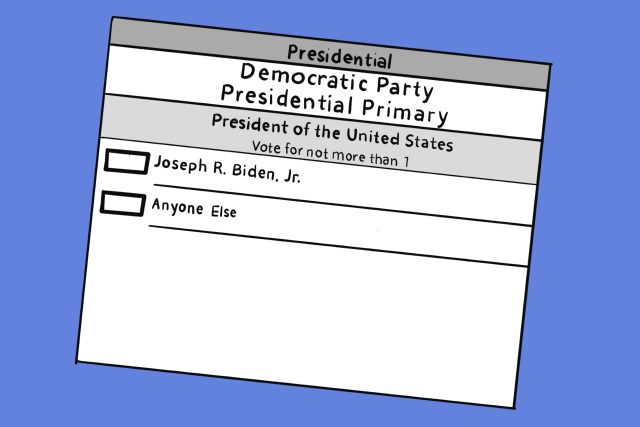[ad_1]
On Feb. 27, I walked into my designated polling location to vote in the Michigan presidential primary. On the Democratic ballot that I had requested, there were only two options: President Joe Biden and “uncommitted.” I did not want to vote for Biden, but I had no other candidate to vote for. I cast my “uncommitted” vote to signify, in part, that I needed another option or I would simply stay home in November.
In the end, the June debate between former President Donald Trump and Biden confirmed my, and many other Americans’, feelings that Biden should not run for a second term. Biden may have dropped out, but that did nothing to solve the actual problem: It was entirely irresponsible for his candidacy to have even reached that point. Had there been a viable Democratic challenger during the primaries, Biden’s visible weakness would have propelled a different candidate to the top of the Democratic ticket months earlier. To avoid repeats of this election cycle going forward, every single incumbent should undergo a primary challenge to ensure their legitimacy with the American people.
First and foremost, putting an end to uncontested primaries gives each party a chance to be more progressive instead of stagnant. Instead of incumbents campaigning on the successes of their four years, they will have to fight with other challengers on their visions of the future. Vice President Kamala Harris’ campaign, at the beginning of its rollout, exemplified this principle with the phrase “We Are Not Going Back.” Her polling and fundraising numbers show the advantages that come with infusion of new life into a party that needed a switch.
Prioritizing new ideas underscores the more fundamental notion that contested primaries are more democratic. A lack of serious challengers in uncontested primaries denies voters the opportunity to have a real say in who they want their party to nominate for president.
During the 2024 presidential primaries, a majority of those who voted for Biden in 2020 said he was too old to be president. In a hypothetical contested primary, voters would have been able to use their vote to voice this, ultimately helping a different candidate secure the Democratic nomination for president.
Because this process didn’t happen, that same majority was stuck with Biden as their non-Trump option, despite the fact that they did not think he was fit to serve in a second term. Then, not only did they not get an adequate say in the nomination the first time, but they also didn’t get any say the second time. Biden immediately placed Harris at the forefront of the race as soon as he dropped out.
Even though her rise brought newfound excitement, voters still weren’t the ones who decided to nominate her. Contesting primaries would return that agency voters have been deprived of. This would and should, of course, apply to every year — even when it is clear that the party’s base wants the incumbent to run again, because the people in our country deserve to have their say.
Additionally, instilling a sense of competition for a party’s nomination, even among incumbents, would encourage candidates to stick to their campaign’s policy promises.
The Uncommitted National Movement is one realistic and timely example. The movement advocates for, among other things, an immediate ceasefire between Hamas and Israel in the Gaza Strip — something Biden has been unsuccessful in securing since February.
An Uncommitted aligned candidate would have challenged Biden on his inability to secure a ceasefire deal and present an alternative to Biden’s failure. Serious primary challengers would force incumbents to face a challenger that holds them accountable for these failures to follow through.
One potential problem is that constant primaries with legitimate presidential candidates would extend “election season.” This means more time devoted to campaigning, with candidates spending more money. 2024 is on track to be the most expensive election ever, and devoting money to an incumbent challenger may not be fiscally feasible for either party looking to win the presidency.
An easy solution is to limit presidential primary spending to traditional “hard money.” With no dark money spending, which is responsible for the huge lump sum donations given to candidates, there would be a limit on the excess that could occur within a primary. Money raised will be well earned and used with intention. If a challenger has legitimate strong support, this could even be an advantage for them, as incumbents would not have access to traditional big donors that undoubtedly helped them in previous general elections.
With all the election fanfare that has gone on in the past four months, it is easy to forget that there was a Democratic challenger in some primaries. U.S. Rep. Dean Phillips of Minnesota made a rather unprecedented run for the Democratic nomination. However, there were no debates, interviews or donations. In the end, he only received criticism from his peers, ridicule online, a modest amount of votes and complete vindication. Giving courageous people like Phillips institutional support and also our attention as voters will give us the best path to choosing our ideal candidates going forward.
Gabe Efros is an Opinion Analyst who writes about the American political climate, on and off campus. He can be reached at gefros@umich.edu.
Related articles
[ad_2]
Source link











